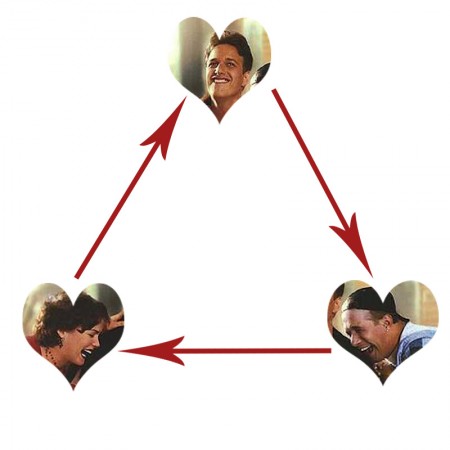On Love Triangles
I've been thinking about love triangles lately. It's no secret that love triangles are a popular element in many young adult novels, from Twilight (obviously) to Carrie Ryan's Forest of Hands and Teeth and Cassandra Clare's Clockwork Angel. I know that lots of folks have very pointed opinions on love triangles, so I'm going to start out by clarifying where I'm coming from.
- I don't think love triangles are inherently bad. They can be deliciously complicated and can be used to create excellent tension and drama in a story.
- That said, I don't think love triangles are inherently good. They can come off as more gimmick than genuine, and they don't always work.
- Yes, I have a reason that I'm interested in love triangles, and that reason is in my next book.
- I am not a fan of love triangles in real life. I'm not talking about real life here. I'm talking about fiction.
So, for a long time now, I've been thinking about what people mean by "love triangle." Is it: (A) One person who has two people interested in her?
 (B) Or what if A is interested in B who is interested in C who is interested in A?
(B) Or what if A is interested in B who is interested in C who is interested in A?
(C) Or is it A who is interested in B and C, but B and C are close friends?
(Tessa fanart by smitth.)
Carrie Ryan has an especially interesting perspective on love triangles in YA. She argues:
To me, that's the essence of a love triangle -- each man is a viable choice for the heroine but each speaks to a different part of who she is. The heroine isn't choosing between two men, she's choosing who SHE wants to be and that will dictate who the right match is.
I think that Carrie's definition of a love triangle is actually the kind that is most often seen in YA. The two options for the heroine (and it's pretty much always a heroine choosing between two guys) are indeed symbolic of who she wants to be in the future.
I don't think this is my favorite kind of love triangle, though, and I say that mostly on a gut-instinct level. I think what's missing for me is the connector between the two options. If the two love potential love interests have no relationship with each other (romantic or not), there is less of a triangular charge; it's really more of a V.
This is partly why I have often been surprised when readers tell me they think there's a love triangle in Ash. I think that the fact that they see one mostly speaks to the fact that readers actually really enjoy love triangles and they're on the lookout for them. There are, indeed, three people who could potentially form points on a love triangle in Ash, but two of those people never connect. For me, that erases the triangular aspect of it.
However, I didn't really get a firm grasp on what makes a love triangle work for me until I read this article in Entertainment Weekly about season 2 of The Walking Dead. [SPOILER WARNING for The Walking Dead!]
''When it comes to the triangle, you can't pick two people who don't love each other,'' says Callies [actress Sarah Wayne Callies, who plays Lori Grimes]. ''I think Rick and Shane love each other every bit as much as Rick and Lori, and every bit as much as Lori and Shane.
For the record, I only recently watched season 1 of The Walking Dead and I totally loved it. I cannot wait till the season 2 premiere (this Sunday! woohoo!).
I thought one of the most interesting things about the first season was the love triangle, particularly because the connection between Rick and Shane was so fascinating. Before the zombie apocalypse, they were police partners and best friends. Afterward, Shane saved Rick's wife, Lori, from certain (walking) death, and in the process began a relationship with her while believing that Rick was dead. When Rick turns out to be very much alive, Lori ends her relationship with Shane, and neither of them tell Rick that they were together when he was gone. However, the tension between Lori and Shane, and between Shane and Rick (who is pretty much clueless during the first season, at least) is palpable. What was so awesome about it was the fact that the viewer knew what was going on when Rick did not, so all the interactions between the three characters were fraught with tension and had a fascinating subtext.
[END SPOILERS for The Walking Dead]
So, after reading the EW article I finally understood what my favorite kind of love triangle includes: an emotional connection between every branch of the triangle. And it doesn't have to be romantic — in fact, I think it might work best if the connector between two points is not romantic. This is essentially love triangle (C) above, but it took that Walking Dead quote to really drive it home for me.
Which then made it much easier for me to recognize that one of my favorite love triangles is on The Vampire Diaries.
The emotional connection between Stefan and Damon is not romantic (though some would argue with that); it is fraternal. But their brotherly love for each other is what makes this triangle work. It makes each brother want to sacrifice himself for the other, and that kind of love contrasts in deliciously complicated ways with the romantic love each feels for Elena.
This combination of love/sacrifice/betrayal/lust is what makes some love triangles, such as the Arthur-Guinevere-Lancelot one, endure for centuries.
And for the writer … well, I have to say that love triangles are really fun to write. So many possibilities! So little time. ;)


